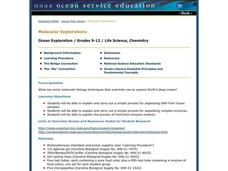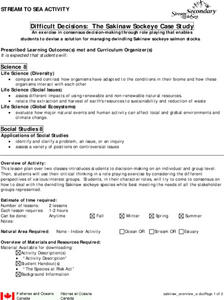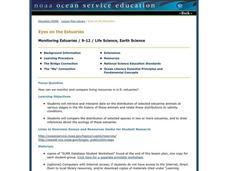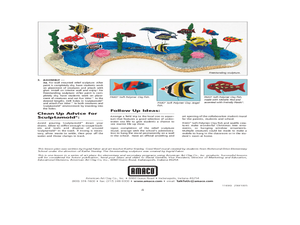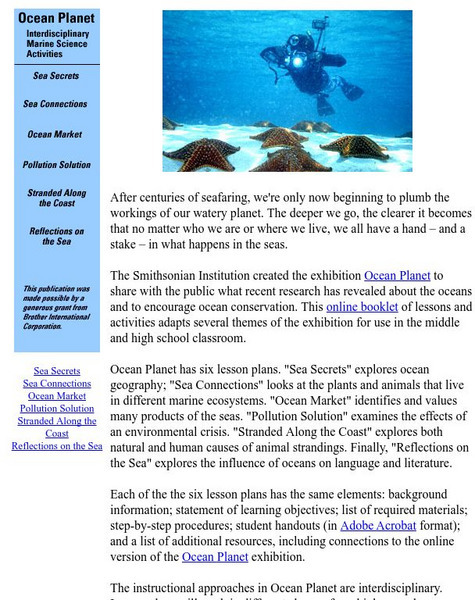Curated OER
Molecular Explorations
Young scholars explain the processes for separating DNA from tissue and separating complex mixtures. In this exploratory lesson students complete a lab where they extract DNA.
Curated OER
Oil Slick Emergency
Students examine how to recover and remove oil from an oil spill. In this oil spill clean-up lesson students use role play and act like a committee to determine how to clean up an oil spill.
Curated OER
Estuaries, Estuarine Habitats, and Adaptations
Students conduct research on estuaries. They design and construct an estuary, describe the physical characteristics of an estuary, and create a diagram illustrating an estuarine food web.
Curated OER
Unique Plants of the Biomes
Pupils examine how the earth is divided into different biomes that are characterized by a distinctive climate. In this earth's surface lesson students identify adaptations of plants in specific biomes.
Curated OER
Biomimicry: Working Together, Cooperative Design
Students explore the concept of biomimicry. In this cooperative design lesson, students consider how cooperation is connected to nature and then collaborate to create their own cooperative designs for the future.
Curated OER
Difficult Decisions: The Sakinaw Sockeye Case Study
Eighth graders examine Sakinaw Sockeye as species at risk, participate in role playing exercise to consider different perspectives of various interest groups, and try to come to consensus on how to deal with dwindling Sakinaw sockeye...
Curated OER
Natural History of Costa Rica
Students use outline maps to become acquainted with Costa Rica. They see how it was formed and how its origin has created very diverse environments. Students then use atlases and compare their physical maps with maps of climate and the...
Curated OER
Water Issues on Puerto Rico and Oahu: A Comparison of Two Islands
Fifth graders explore how the tow islands receive and use fresh water. They also address some of the threats to the fresh water supply on each island. Students explore the lesson objectives through water cycle models and experiments.
Curated OER
World Geography: Climate Change Round Table
Middle schoolers are able to explain the suspected causes of relatively recent climate changes, specifically the observed global warming. They discuss how unusual or extreme global warming disrupts the balance of the earth's geo-spheres.
Curated OER
Eyes on the Estuaries
Students study estuaries and compare several ones in the U.S. In this estuary lesson students interpret data and compare the distribution of different species.
Curated OER
The Rocky Shore
Students compare a realistic landscape painting with a photograph of the same place.
Curated OER
Exploring Life in the Coral Reef
Students study life forms in coral reefs. In this ocean life lesson, students study life in coral reefs as they create a coral reef sculpture.
Smithsonian Institution
Smithsonian: Ocean Planet: Interdisciplinary Marine Science Activities
Smithsonian Institution presents ?Ocean Planet: Interdisciplinary Marine Science Activities?. Through this series of six interdisciplinary lessons, students will look at such things as the organisms in different marine ecosystems, the...
The Franklin Institute
Treasures@sea: Exploring the Ocean Through Literature
This extensive resource consists of learning activities that integrate language arts with oceanography. Each activity is based on one of seven books about the ocean and are written to be adaptable. Includes writing activities, games and...
National Geographic
National Geographic: Ocean Abiotic Factors
After looking at examples of biotic and abiotic factors in ecosystems, students focus on abiotic factors in marine ecosystems, the physical processes that are involved, and the impact human activities can have on these. Includes handouts...
National Geographic
National Geographic: Ocean Abiotic Factors
Students define and provide examples of abiotic and biotic factors of different ecosystems. Then they investigate the importance of abiotic factors and physical processes within ocean ecosystems.
Science Education Resource Center at Carleton College
Serc: Lab 3: Oh What a Tangled Web: Ecosystem Based Management
A lab experiment in a series of experiments that looks at fisheries. In this particular lab, students use tools like Pacific Ocean Shelf Tracking to learn about the management of fisheries through an ecosystem-based approach. During this...
NOAA
Noaa: National Ocean Service Education: Estuaries
Illustrated tutorial explains estuary ecosystems. Animations and illustrations help students become more familiar with the plant and animal communities which make up this coastal habitat.
Texas A&M University
Texas A&m University: Fisheries Activities
Site from the Texas A&M University provides activities on fisheries that teachers can use in their classrooms to help students learn more about them. Some of the topics included are ecosystems, ocean food chains, fish prints and more.
Nature Conservancy
The Nature Conservancy: Coral Reefs of Palau: Nature's Amazing Underwater Cities
This lesson takes learners on a virtual field trip to the coral reefs of Palau where they will explore amazing underwater cities found near a remote network of islands in the Pacific Ocean. Learn all about an ecosystem of symbiosis....
Exploring Nature
Exploring Nature Educational Resource: Oceans of the World
A set of illustrated fact pages, and some activity sheets, on coral reefs, tidal pools, and ocean ecosystems. Find maps, graphic organizers, and a movie link to tidal zones. Hyperlinks to specialized vocabulary words are also provided....
National Geographic
National Geographic: Coral Reef Fish Survey Simulation
Students will learn surveying methods for an ecosystem through a short video. The video focuses on exploring the number and types of fish and the health of the coral reef ecosystem. Site includes a lesson plan and activity worksheet.
The Association of the British Pharmaceutical Industry
Abpi: Human and Animal Habitats
An interactive learning game where students answer whether or not certain environments would be suitable for different animals. Printable worksheets are available for review at the end of the activity.
Scholastic
Scholastic: Ocean Life
Good starting point for researching ocean life. Find general information, research-topic ideas, a glossary of important terms and people, and numerous links to related sites.


